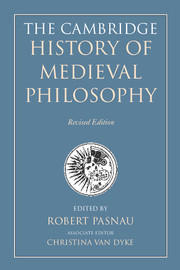Book contents
- Frontmatter
- Contents of Volume 1
- Preface
- List of contributors
- Frontmatter
- Contents of Volume 2
- Introduction
- I Fundamentals
- II Logic and language
- 10 The development of logic in the twelfth century
- 11 Terminist logic
- 12 Nominalist semantics
- 13 Inferences
- 14 Sophismata
- 15 Grammar
- III Natural philosophy
- IV Soul and knowledge
- V Will and desire
- VI Ethics
- VII Political philosophy
- VIII Metaphysics
- IX Theology
- Appendices
- Bibliography of primary sources
- Bibliography of secondary sources
- Index nominum
- Index rerum
- References
11 - Terminist logic
from II - Logic and language
Published online by Cambridge University Press: 05 August 2014
- Frontmatter
- Contents of Volume 1
- Preface
- List of contributors
- Frontmatter
- Contents of Volume 2
- Introduction
- I Fundamentals
- II Logic and language
- 10 The development of logic in the twelfth century
- 11 Terminist logic
- 12 Nominalist semantics
- 13 Inferences
- 14 Sophismata
- 15 Grammar
- III Natural philosophy
- IV Soul and knowledge
- V Will and desire
- VI Ethics
- VII Political philosophy
- VIII Metaphysics
- IX Theology
- Appendices
- Bibliography of primary sources
- Bibliography of secondary sources
- Index nominum
- Index rerum
- References
Summary
Terminist logic is a specifically medieval development. It is named from its focus on terms as the basic unit of logical analysis, and so it includes both supposition theory, together with its ramifications, and the treatment of syncategorematic terms. It also includes other areas of investigation not directly linked with Aristotelian texts, notably obligations, consequences, and insolubles (see Chapters 10, 13, and 14).
Logic was at the heart of the arts curriculum, for it provided the techniques of analysis and much of the vocabulary found in philosophical, scientific, and theological writing. Moreover, it trained students for participation in the disputations that were a central feature of medieval instruction, and whose structure, with arguments for and against a thesis, followed by a resolution, is reflected in many written works. This practical application affected the way in which logic developed. While medieval thinkers had a clear idea of argumentation as involving formal structures, they were not interested in the development of formal systems, and they did not see logic as in any way akin to mathematics. Logic involved the study of natural language, albeit a natural language (Latin) that was often regimented to make formal points, and it had a straightforwardly cognitive orientation. The purpose of logic was to separate the true from the false by means of argument, and to lead from known premises to a previously unknown conclusion. In this process, the avoidance of error was crucial, so there was a heavy emphasis on the making of distinctions and on the detection of fallacies. The procedures involved often have the appearance of being ad hoc, and modern attempts to draw precise parallels between medieval theories as a whole and the results of contemporary symbolic logic are generally doomed to failure, even though there are many fruitful partial correlations.
- Type
- Chapter
- Information
- The Cambridge History of Medieval Philosophy , pp. 146 - 158Publisher: Cambridge University PressPrint publication year: 2014



